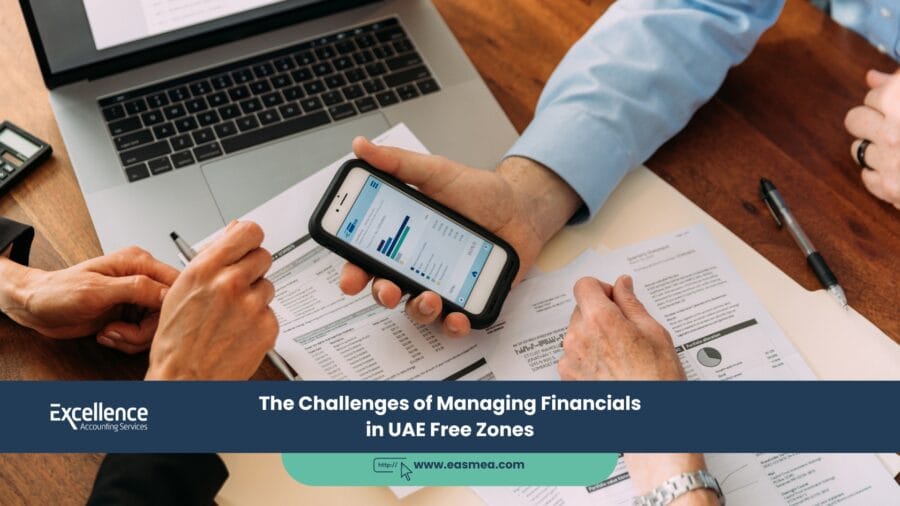Navigating the financial landscape of UAE Free Zones can be both rewarding and challenging. These specialized economic areas are designed to attract foreign investments by offering unique benefits such as tax advantages, 100% foreign ownership, and simplified regulations.
- Why Financial Management in Free Zones is Complex
- Advantages of UAE Free Zones
- How Accountants Add Value to UAE Free Zone Businesses
- Common Financial Mistakes to Avoid in UAE Free Zones
- Case Studies of Success Stories in Free Zones
- Future Trends in UAE Free Zone Financial Management
- FAQs about Managing Financials in UAE Free Zones
- Financial Management Solutions for Your Business
However, the true complexities lie beneath the surface, where managing finances requires meticulous planning, an in-depth understanding of regulatory nuances, and professional expertise to fully harness these advantages while avoiding costly pitfalls.
Without proper guidance, businesses may find themselves grappling with compliance issues, missed opportunities for tax optimization, and inefficiencies in financial reporting.
Why Financial Management in Free Zones is Complex
Managing financial in UAE Free Zones involves navigating a maze of legal, regulatory, and operational challenges that can overwhelm businesses without the right expertise. While the allure of tax exemptions and the promise of streamlined operations draw investors, the reality involves layers of complexity that require keen attention to detail.

Key Challenges:
- Tax Planning and Compliance: Free Zones offer significant tax benefits, but these zones are not a tax-free utopia. Businesses must still address VAT obligations, which apply to certain transactions, and prepare for corporate tax requirements where applicable. Missteps in interpreting or implementing tax laws can result in severe penalties, impacting profitability and operations.
- Accounting Standards: The UAE follows stringent accounting regulations, often aligned with the International Financial Reporting Standards (IFRS). Ensuring that financial reports meet these global standards is crucial for maintaining transparency and avoiding regulatory scrutiny. Failure to align with IFRS can not only lead to penalties but also erode investor confidence.
- Banking and Currency Management: Operating in Free Zones often involves dealing with clients and suppliers from multiple countries, necessitating multi-currency bank accounts. Businesses must also manage risks associated with currency fluctuations, which can affect cash flow and profit margins if not properly hedged or planned for.
- Audit Requirements: Free Zones mandate annual financial audits to ensure compliance and transparency. Preparing for these audits requires meticulous record-keeping and alignment with local regulations. Missing deadlines or failing to provide accurate data can lead to fines or, worse, operational disruptions that impact business continuity.
Understanding these challenges is the first step toward effective financial management in Free Zones. With expert guidance, businesses can not only overcome these hurdles but also turn them into opportunities for growth and optimization.
Advantages of UAE Free Zones
UAE Free Zones are a magnet for entrepreneurs and global businesses alike, thanks to their attractive benefits, which go beyond just financial incentives. They provide a robust framework for businesses to grow and thrive in an international market, offering not only economic benefits such as tax exemptions and profit repatriation but also operational efficiencies like streamlined registration processes and reduced bureaucratic hurdles.
Moreover, Free Zones create a dynamic ecosystem that fosters innovation and collaboration by connecting businesses with like-minded entrepreneurs and industry leaders. These zones are strategically designed to serve as launchpads for companies aiming to establish a strong presence in the Middle East and beyond.
Below is a comprehensive breakdown of the advantages:
| Advantage | Description |
|---|---|
| Tax Benefits | Free Zones often offer exemptions from corporate and income taxes. |
| 100% Foreign Ownership | Unlike mainland businesses, Free Zone companies allow full foreign control. |
| Streamlined Setup | Business registration and licensing processes are simplified. |
| Repatriation of Profits | Companies can repatriate 100% of their profits without restrictions. |
| Strategic Locations | Proximity to major ports and airports ensures efficient global connectivity. |
| Networking Opportunities | Free Zones create vibrant business ecosystems ideal for collaboration. |
| Custom Duty Exemptions | Many Free Zones offer duty-free import/export opportunities. |
These advantages make Free Zones an attractive option for startups and established businesses seeking a strategic foothold in the Middle East.
How Accountants Add Value to UAE Free Zone Businesses
Professional accountants are not just number crunchers; they are strategic partners who help businesses navigate the intricate financial ecosystem of UAE Free Zones. With their expertise, accountants enable companies to make informed decisions, stay compliant with regulations, and unlock opportunities for growth.
1. Minimizing Tax Liabilities
Strategic tax planning is vital for reducing a company’s tax burden while adhering to legal requirements. Accountants analyze each transaction, ensuring businesses leverage all available exemptions and rebates. They also identify potential tax-saving opportunities, such as optimizing expenses and structuring operations efficiently.
Example: A tech startup in Dubai Internet City, faced with high VAT liabilities on imported software, engaged an accountant who identified qualifying exemptions. This move saved the company thousands in unnecessary expenses, freeing up capital for expansion.
2. Ensuring Compliance
Regulatory compliance in the UAE is dynamic, with laws and deadlines evolving to meet global standards. Accountants monitor these changes closely, ensuring their clients meet every requirement. This vigilance prevents penalties, builds trust with stakeholders, and maintains the business’s reputation.
Example: A logistics firm overlooked VAT filings for cross-border transactions. An accountant’s review corrected the errors before regulatory audits, sparing the company significant fines and preserving client relationships.
3. Supporting Long-Term Growth
Accountants bring more to the table than routine bookkeeping; they provide actionable insights into cash flow, profit margins, and market trends. By analyzing financial data, they help businesses plan for scalability, manage risks, and seize growth opportunities in competitive markets.
Example: A manufacturing company expanded its operations across GCC countries by utilizing data-driven recommendations from their accountant. This guidance not only optimized production costs but also improved their supply chain efficiency, boosting overall profitability.
4. Optimizing Financial Operations
Accountants streamline financial processes such as payroll management, invoicing, and budgeting. By introducing automation and best practices, they reduce errors and free up management’s time to focus on strategic initiatives.
Example: A retail company’s accountant implemented automated payroll systems, saving hours of manual work each month. This efficiency allowed the business to channel resources toward customer acquisition strategies.
To further enhance this document, consider including additional sections such as:
Common Financial Mistakes to Avoid in UAE Free Zones
Managing finances in UAE Free Zones can be daunting, and many businesses unknowingly make errors that could lead to compliance issues or financial losses. Here’s a detailed breakdown of common pitfalls:
- Overestimating Tax Exemptions: While UAE Free Zones offer significant tax benefits, many businesses mistakenly believe they are completely tax-free. VAT and certain corporate tax regulations may still apply based on the nature of transactions and operations.
- Neglecting Compliance with Local Laws: Overlooking the specific regulatory requirements of individual Free Zones can lead to penalties. For instance, failing to submit annual financial audits is a frequent mistake among startups.
- Improper VAT Registration: Businesses crossing the revenue threshold often delay VAT registration, risking fines. Misinterpreting taxable versus exempt supplies can also lead to errors.
- Ignoring IFRS Standards: Financial reporting in the UAE must align with IFRS. Failure to adhere to these standards can erode investor confidence and invite regulatory scrutiny.
- Weak Record-Keeping Practices: Poor documentation of invoices, contracts, and transactions often leads to audit challenges and compliance issues. Maintaining robust financial records is essential.
- Overlooking Currency Risks: Businesses dealing in multiple currencies may underestimate the impact of fluctuating exchange rates, which can significantly affect profit margins.
- Inadequate Budgeting and Forecasting: Failing to anticipate future cash flow needs or potential market changes can hinder growth and lead to liquidity crises.
- Delayed Filing of Financial Reports: Missing deadlines for VAT returns, tax filings, or audit submissions is a common mistake that results in hefty fines.
- Underestimating the Need for Professional Advice: Many businesses attempt to manage finances internally without seeking expert guidance, leading to errors that could have been easily avoided by a professional accountant.
- Non-Compliance with Payroll Regulations: Mismanagement of employee wages, end-of-service benefits, and other payroll-related obligations can lead to labor disputes and penalties.
By avoiding these mistakes, businesses can ensure smooth financial operations and maintain a solid compliance record within UAE Free Zones. Seeking expert advice and leveraging financial management tools can help mitigate these risks effectively.Tools and Technologies for Financial Management
Case Studies of Success Stories in Free Zones
Case Study 1: Tech Startup in Dubai Internet City
A small tech company faced challenges in managing VAT on imported software. With the guidance of a professional accountant, the startup identified qualifying exemptions and streamlined its VAT filings. This strategic move saved the business thousands in expenses and allowed it to reinvest the funds into product development, leading to a 30% increase in revenue over the following year.
Case Study 2: Logistics Firm in Jebel Ali Free Zone
A mid-sized logistics firm encountered penalties for late VAT filings due to cross-border transactions. An accounting firm audited their processes, corrected errors, and established an automated compliance system. As a result, the company avoided further fines and improved its cash flow management, enabling expansion into new markets.
Case Study 3: Manufacturing Company in Sharjah Airport Free Zone
A manufacturing business sought to scale operations but struggled with inefficient cost structures. Accountants conducted a detailed analysis of their financial data and identified areas for cost optimization. By renegotiating supplier contracts and improving production efficiency, the company increased its profit margins by 25% and successfully entered the GCC market.
Case Study 4: Retail Business in Ajman Free Zone
A retail chain faced issues with payroll compliance and end-of-service benefit calculations. With the help of an accountant, they implemented a digital payroll system that ensured timely and accurate payments. This improvement enhanced employee satisfaction and reduced payroll processing time by 50%, allowing the management to focus on customer acquisition strategies.
These real-world examples highlight how professional accountants can transform financial challenges into growth opportunities for businesses in UAE Free Zones.
Future Trends in UAE Free Zone Financial Management
The financial landscape in UAE Free Zones is rapidly evolving, driven by regulatory changes, technological advancements, and shifting global economic trends. Businesses operating within these zones must stay ahead by adapting to future developments to remain competitive and compliant. Here are some key trends shaping the future of financial management in Free Zones:
1. Digital Transformation
Financial processes are increasingly being automated through cloud-based accounting software, artificial intelligence (AI), and blockchain technology. These tools enhance efficiency, accuracy, and transparency, enabling businesses to streamline operations and reduce errors.
2. Integration of ESG (Environmental, Social, and Governance) Reporting
As global standards push for sustainability, companies in Free Zones are expected to incorporate ESG metrics into their financial reporting. This shift not only ensures compliance with international norms but also attracts socially conscious investors.
3. Evolving Tax Regulations
The introduction of corporate tax in the UAE and updates to VAT laws mean that businesses must adopt robust tax planning strategies. Accountants will play a crucial role in helping companies navigate these changes effectively.
4. Global Market Dynamics
The UAE’s strategic position as a trade hub means Free Zone businesses must adapt to fluctuations in global markets, including supply chain disruptions and currency volatility. Advanced financial modeling will be essential to mitigate risks.
5. Data-Driven Decision Making
The adoption of big data analytics in financial management is transforming how businesses make decisions. By leveraging data insights, companies can identify trends, predict financial outcomes, and optimize resource allocation.
6. Increased Focus on Cybersecurity
As financial operations move online, protecting sensitive data from cyber threats becomes paramount. Businesses in Free Zones must invest in robust cybersecurity measures to safeguard their digital infrastructure.
By staying informed and adopting these trends, businesses in UAE Free Zones can position themselves for sustainable growth and resilience in an increasingly complex financial environment.
FAQs about Managing Financials in UAE Free Zones
Not entirely. While Free Zones in UAE provide corporate tax exemptions, certain transactions remain subject to VAT depending on their nature. For example, the sale of goods or services between mainland entities and Free Zone businesses might incur VAT.
Businesses must carefully assess each transaction to determine its taxability and ensure compliance with UAE tax laws. Ignoring these nuances can lead to financial discrepancies and penalties.
Yes, most Free Zones require annual audits as part of their regulatory compliance framework. These audits ensure transparency in financial operations, validate the accuracy of financial statements, and help businesses identify any discrepancies or irregularities.
For instance, audits provide credibility to stakeholders, including investors and government authorities, showcasing that the business operates with integrity and adheres to all local and international standards.
Neglecting this requirement can result in fines, restricted operations, or even revocation of Free Zone licenses in extreme cases. Thus, timely preparation and submission of audited financial statements are crucial for maintaining a smooth business trajectory in UAE Free Zones.
Yes, many banks offer multi-currency accounts tailored for Free Zone businesses. These accounts allow businesses to conduct transactions in various currencies, making them ideal for companies with international clients or suppliers.
Multi-currency accounts help mitigate currency conversion fees and provide flexibility in handling global trade. Additionally, they offer financial convenience by centralizing multiple currency operations under a single account, reducing administrative overhead and improving cash flow management.
By leveraging these accounts, businesses can efficiently manage risks associated with exchange rate fluctuations and ensure smoother international operations.
Non-compliance with UAE accounting standards can lead to a range of penalties, including hefty fines, operational suspensions, or even the revocation of business licenses in extreme cases. Fines may vary depending on the severity and frequency of the violations.
For example, repeated failure to adhere to International Financial Reporting Standards (IFRS) or to submit accurate financial statements on time can attract significant financial repercussions.
Additionally, non-compliance damages a company’s reputation, erodes stakeholder trust, and may result in challenges when seeking banking or investment support.
Businesses are encouraged to stay proactive in their compliance efforts, leveraging professional expertise to mitigate risks.
Yes, but it depends on the revenue threshold and the nature of transactions. Businesses that exceed the mandatory VAT registration threshold, currently AED 375,000 in taxable supplies, are required to register for VAT.
Even companies below this threshold may choose voluntary registration if their taxable supplies and imports exceed AED 187,500. The nature of transactions also plays a critical role, as Free Zone entities conducting business with mainland UAE or international clients may have additional VAT implications. Understanding these requirements is essential to avoid non-compliance and potential penalties.
Absolutely. Accountants play a pivotal role in financial forecasting by leveraging historical data, market trends, and advanced analytical tools to predict future financial outcomes.
They assist businesses in creating realistic budgets, identifying potential risks, and optimizing cash flow management. For example, an accountant can help a business anticipate seasonal fluctuations in revenue or expenses, ensuring sufficient liquidity during slower periods.
Furthermore, their expertise in scenario planning enables companies to prepare for various economic conditions, supporting strategic decisions such as expansions, investments, or cost-saving initiatives.
IFRS ensures transparency, consistency, and accuracy in financial reporting, allowing businesses in UAE Free Zones to present their financial statements in a globally recognized format.
This standardization fosters trust among stakeholders, including investors, banks, and regulatory authorities. By adhering to IFRS, companies can also enhance their ability to attract international partnerships and investments, as the standards provide a clear and comparable picture of financial health.
Moreover, compliance with IFRS helps businesses mitigate the risk of regulatory penalties and ensures alignment with the evolving financial regulations in the UAE.
Ensuring compliance with Free Zone regulations involves multiple steps. First, engage an experienced accountant familiar with UAE laws to navigate the complexities of tax filings, VAT registrations, and corporate requirements. Accountants stay updated on regulatory changes, ensuring timely submission of financial audits and other mandated reports.
Additionally, businesses should invest in accounting software that aligns with UAE regulatory frameworks, enabling accurate record-keeping and reducing manual errors. Regular internal reviews of financial practices and compliance training for key staff members also play a crucial role in maintaining adherence to Free Zone regulations, minimizing the risk of penalties and operational disruptions.
Yes, many accountants offer payroll management as part of their services. This includes tasks such as calculating employee salaries, managing end-of-service benefits, ensuring compliance with UAE labor laws, and preparing payroll reports.
Additionally, accountants often implement automated payroll systems that streamline processes, reduce errors, and ensure timely payments. Effective payroll management contributes to employee satisfaction and avoids potential disputes, while also ensuring that the business remains compliant with Free Zone regulations and local labor requirements.
Hiring an accounting firm provides businesses with specialized expertise, ensuring accurate financial management and compliance with regulations. Professional accountants save valuable time by handling complex financial tasks such as tax planning, VAT registration, and audit preparation, allowing business owners to focus on growth and operations.
Additionally, accounting firms provide strategic insights to optimize cash flow, reduce tax liabilities, and streamline operations. By staying updated on ever-changing regulations, they ensure that businesses avoid penalties and maintain a strong financial standing, fostering trust among stakeholders and paving the way for sustainable growth.
Financial Management Solutions for Your Business
Understanding and addressing the challenges of financial management in UAE Free Zones is critical for success. Partnering with experienced accountants not only ensures compliance but also supports long-term growth by optimizing resources and uncovering new opportunities.
Ready to tackle your Free Zone financial challenges? Contact Excellence Accounting and Bookkeeping Company today! Let our team of experts guide you through tax planning, compliance, and growth strategies tailored to your business.




